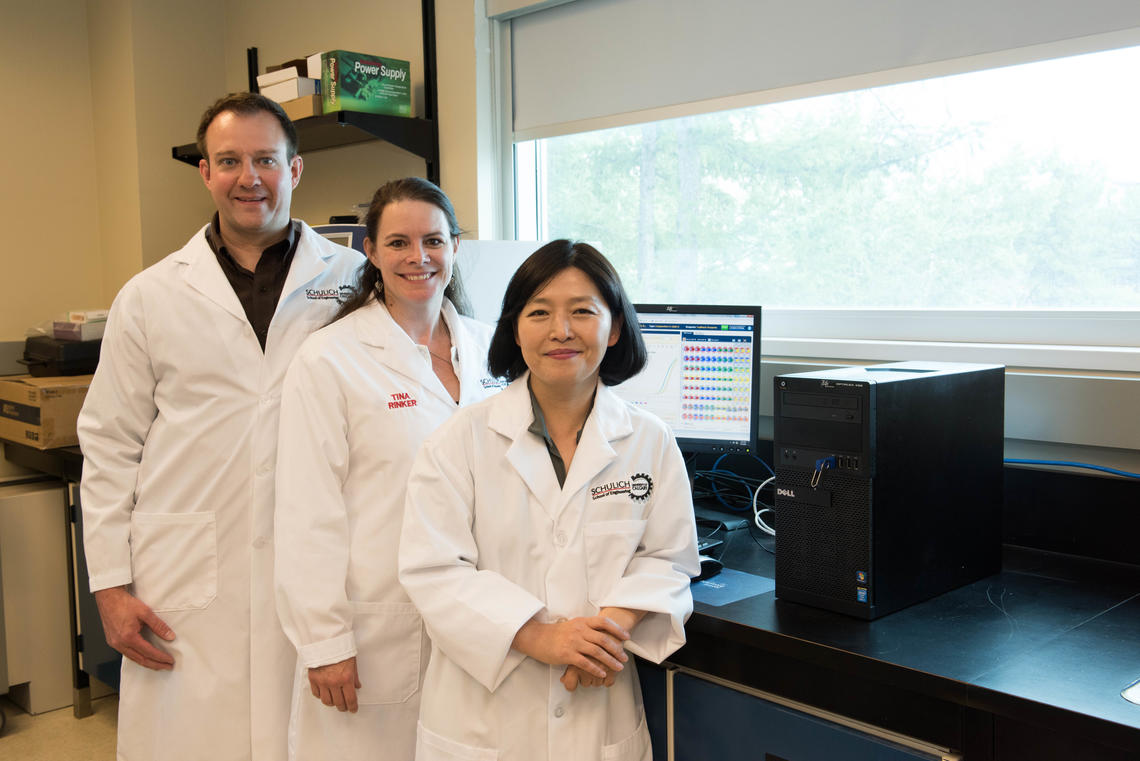Sept. 16, 2015
New breast cancer test can shorten wait time for patient diagnostics

From left, Bob Shepherd, Kristina (Tina) Rinker, and Hyeyoung Lee.
Mark Skogen
The waiting period for breast cancer patients could get a lot shorter thanks to a new diagnostic kit developed with help from Schulich School of Engineering researchers. The kit is being commercialized through a new Calgary-based spin-off company, Syantra Diagnostics Inc.
This new lifesaving technology is faster and more precise than conventional methods for diagnosing breast cancer. Using a very small amount of tissue from the tumour, it can show what type of cancer someone has. The new test is the product of a research innovation partnership between Alberta and the Gangwon province in South Korea with additional funding providing by Optipharm-M & D, Inc.
Test eliminates need for a secondary test to detect cancer subtypes
“This test measures gene expression at the molecular level to determine what type of breast cancer is present,” says Bob Shepherd, research associate at Schulich and president of Syantra Diagnostics Inc. “Essentially, we are eliminating a secondary test that some patients may need to detect a cancer subtype.”
The test provides clinicians with more information, locally and in a quicker timeline. Patients may also be able to access effective treatment options sooner. Shepherd also says the test is straightforward.
“The potential reach of this test is global as it is simple to use and eliminates the need for complex lab facilities or sample shipping,” he says. “These kits could be easily used in developing countries where traditional diagnostic infrastructure is not readily available or cost-effective.”
Diagnostic test developed through partnership with South Korean researchers
The test was developed with Schulich’s biomedical engineering research contributions through government and private enterprise funding, making this a true global partnership. The Translational Laboratories at the Tom Baker Cancer Centre in Calgary also provided key support and assistance.
“Our part of the project was to rigorously evaluate the kit, determine effect of key parameters on kit performance, make modifications to the kit to enhance marketability and manufacturing, and develop specific mathematical relationships to enable users to identify cancer subtypes from the data,” says Kristina (Tina) Rinker, director of the Centre for Bioengineering Research and Education at the Schulich School of Engineering.
The partnership also included student and postdoctoral researcher exchanges between Calgary and Gangwon, which was valuable in creating a global data set.
“The Canadian collaboration was an effective way to expand our research in North America,” says Hyeyoung Lee, researcher in the Department of Biomedical Laboratory Science at Yonsei University and Syantra co-founder. “Our unique algorithm is how we can differentiate results indicating the presence of cancer.”
The new diagnostic kit will be available for purchase for research use in fall 2015 as the first step towards clinical use.
The University of Calgary is a global leader in Engineering Solutions for Health: Biomedical Engineering, producing unprecedented insights into complex, global health care challenges. Using engineering approaches to advance knowledge and solve problems in biology, medicine and health care, researchers from engineering, medicine, kinesiology, veterinary medicine, science and nursing are at the forefront of advancing diagnostics, neurosurgery, joint repair, and stem cell production.
